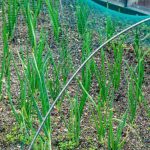Are you interested in starting an organic vegetable garden in South Florida? Organic vegetable gardening in South Florida offers a unique set of challenges and rewards. The warm and humid climate of South Florida provides an ideal environment for growing a wide variety of vegetables. In this article, we will explore the benefits of organic vegetable gardening in South Florida, as well as provide tips and resources for getting started on your own organic garden.
South Florida’s year-round warm climate makes it an excellent region for organic vegetable gardening. By using natural and sustainable practices, you can grow a bountiful harvest of healthy and nutritious produce right in your own backyard. Whether you are new to gardening or have years of experience, there is always something new to learn about the specific considerations for growing organic vegetables in South Florida.
In this comprehensive guide, we will delve into the benefits of growing organic vegetables in South Florida’s climate, tips for choosing the right vegetables to grow, preparing your soil, best practices for planting and caring for your crops, managing common pests and diseases, harvesting your bounty, and accessing local resources for successful organic vegetable gardening. With a little knowledge and dedication, you can enjoy the satisfaction of producing your own fresh, delicious organic vegetables right at home.
The Benefits of Growing Organic Vegetables in South Florida’s Climate
Organic vegetable gardening in South Florida offers a plethora of benefits, thanks to the unique climate of the region. Whether you are an experienced gardener or just starting out, there are many advantages to growing organic vegetables in this sunny and warm environment. Here are some of the benefits of growing organic vegetables in South Florida:
1. Extended Growing Season: South Florida’s mild winters and long growing seasons allow for year-round cultivation of a wide variety of organic vegetables. This means that you can enjoy fresh, homegrown produce throughout the year without being limited to just one or two planting seasons.
2. Abundance of Sunshine: With an average of 248 sunny days a year, South Florida provides ample sunlight for your organic vegetable garden. Sunlight is essential for plant growth and photosynthesis, which means your vegetables will thrive in this bright and sunny environment.
3. Diverse Plant Options: The subtropical climate of South Florida allows for a wide range of vegetable options that may not be viable in other regions. From heat-loving plants like tomatoes, peppers, and eggplants to tropical fruits like mangos and bananas, the possibilities for organic vegetable gardening in South Florida are virtually endless.
In addition to these benefits, South Florida’s climate also presents its own set of challenges when it comes to organic vegetable gardening. However, with proper planning and care, you can overcome these challenges and create a bountiful garden filled with delicious and nutritious produce.
Choosing the Right Vegetables to Grow in South Florida
When it comes to organic vegetable gardening in South Florida, it’s essential to choose the right vegetables that are well-suited for the region’s climate and growing conditions. South Florida has a unique subtropical climate with hot and humid summers, mild winters, and sandy soil, making it ideal for growing a variety of vegetables. However, it is important to select vegetables that can thrive in these conditions and provide a bountiful harvest.
One of the key factors to consider when choosing which vegetables to grow in South Florida is the length of the growing season. With a long growing season that extends throughout most of the year, you have the opportunity to plant multiple crops and enjoy a continuous harvest.
Some popular warm-season vegetables that thrive in South Florida’s climate include tomatoes, peppers, eggplant, okra, sweet potatoes, and watermelon. These vegetables love the warmth of South Florida and can be planted during the spring or summer months.
In addition to warm-season vegetables, there are also several cool-season vegetables that can be successfully grown in South Florida during the milder winter months. These include broccoli, cauliflower, carrots, radishes, kale, and lettuce. It’s important to take advantage of the cooler weather in South Florida by planting these vegetables during the fall or winter for a successful harvest.
For those new to organic vegetable gardening in South Florida or looking for low-maintenance options, some recommended vegetables include cherry tomatoes, bell peppers, and herbs like basil and mint. These plants are relatively easy to grow and require minimal care while still yielding an abundant harvest. When selecting your vegetables for organic gardening in South Florida, be sure to consider your preferences as well as what grows best in your specific location within the region.
| Vegetable | Growing Season |
|---|---|
| Tomatoes | Warm-season |
| Peppers | Warm-season |
| Eggplant | Warm-season |
| Lettuce |
Preparing Your Soil for Organic Vegetable Gardening in South Florida
When it comes to organic vegetable gardening in South Florida, one of the most important steps is preparing the soil. The region’s sandy soil can present some challenges, but with the right techniques, you can create a fertile environment for your vegetables to thrive.
One of the first steps in preparing your soil for organic vegetable gardening in South Florida is to test its pH level. Most vegetables prefer a slightly acidic soil with a pH range between 6.0 and 6.8. You can easily test your soil using a DIY kit or by sending a sample to a local agricultural extension service for analysis.
Once you have determined and adjusted the pH level of your soil, it’s time to improve its structure and fertility. Adding organic matter such as compost, manure, or peat moss can help increase the soil’s ability to retain moisture and nutrients – especially important in South Florida’s hot and humid climate.
| Soil Preparation Step | Details |
|---|---|
| Test Soil pH | Determine and adjust pH level to between 6.0 and 6.8 |
| Add Organic Matter | Compost, manure, or peat moss can be added to improve soil structure and fertility |
Best Practices for Planting and Caring for Organic Vegetables in South Florida
Planting Tips
When it comes to planting organic vegetables in South Florida, timing is everything. It’s important to consider the region’s unique climate and growing seasons. For instance, some vegetables, such as tomatoes and peppers, can be planted year-round in South Florida, while others, like lettuce and spinach, are best planted in the cooler months. Be sure to check a planting guide specific to South Florida to ensure your vegetables have the best chance of success.
Watering and Sunlight
In South Florida’s hot and humid climate, proper watering is essential for the health of your organic vegetable garden. It’s important to provide consistent moisture to your plants without overwatering them. Additionally, ensuring that your vegetable garden receives adequate sunlight plays a crucial role in their growth and overall yield. Most vegetables require at least 6-8 hours of sunlight per day for optimal growth in South Florida.
Soil Care
South Florida’s sandy soil presents its own set of challenges for organic vegetable gardening. To improve soil quality and fertility, consider adding compost or other organic matter to enrich the soil. This will help retain moisture and nutrients necessary for healthy plant growth. Regularly testing your soil’s pH levels can also help you determine if any adjustments need to be made to create the ideal environment for your organic vegetables.
By following these best practices for planting and caring for organic vegetables in South Florida, you’ll be well on your way to enjoying a bountiful harvest of fresh and nutritious produce from your own backyard garden.
Dealing With Common Pests and Diseases in South Florida’s Organic Vegetable Gardens
Dealing with common pests and diseases is an inevitable part of organic vegetable gardening in South Florida. The warm and humid climate of the region can create a favorable environment for various insects and pathogens to thrive, posing a challenge for gardeners. However, with proper knowledge and techniques, it is possible to manage and prevent the impact of pests and diseases on your organic vegetable garden.
Identifying Common Pests and Diseases
Before you can effectively deal with pests and diseases in your organic vegetable garden, it is crucial to be able to identify them. Some common pests in South Florida include aphids, whiteflies, caterpillars, and spider mites. As for diseases, fungal infections like powdery mildew and bacterial leaf spot are prevalent in this region. Regular inspection of your plants is essential to catch any signs of infestation or infection early on.
Preventative Measures
One of the best ways to manage pests and diseases in your organic vegetable garden is through preventative measures. This includes practices such as crop rotation, intercropping, and proper spacing between plants to reduce the risk of disease spread. Additionally, using floating row covers can help protect your plants from insect damage while maintaining good air circulation. Choosing disease-resistant varieties of vegetables can also be beneficial in preventing common infections.
Natural Pest Control Methods
When it comes to managing pests in an organic vegetable garden, natural methods are preferred over chemical pesticides. For example, introducing beneficial insects like ladybugs or lacewings can help control aphid populations. Neem oil or insecticidal soap are also effective options for managing soft-bodied insects such as whiteflies. Additionally, creating healthy soil through proper fertilization and composting can strengthen plant immunity against diseases.
By being proactive in identifying potential threats and implementing preventative measures along with natural pest control methods, you can greatly minimize the impact of common pests and diseases on your organic vegetable garden in South Florida.
Harvesting and Enjoying the Fruits of Your Labor
After putting in the hard work of planting and caring for your organic vegetable garden in South Florida, it’s finally time to reap the rewards of your labor. Here are some tips for harvesting and enjoying the fruits of your organic gardening success:
1. Harvest at the right time: One of the keys to enjoying fresh, delicious vegetables from your garden is to harvest them at the peak of ripeness. Be sure to check the recommended harvest times for each type of vegetable you’re growing, as this can vary depending on the variety and growing conditions.
2. Enjoy your harvest: There’s nothing quite like eating a meal made with vegetables you’ve grown yourself. Whether it’s a salad with fresh lettuce and tomatoes or a stir-fry with homegrown bell peppers and squash, savoring the flavors of your own organic produce is incredibly rewarding.
3. Preserve your harvest: If you find yourself with an abundance of produce from your organic vegetable garden, consider preserving some for later use. You can freeze, can, or pickle your excess vegetables to enjoy them throughout the year.
4. Share the bounty: If you have more than enough produce to consume on your own, consider sharing it with friends, family, or neighbors. Not only is this a generous gesture, but it also helps build a sense of community around organic vegetable gardening in South Florida.
By following these tips, you can fully enjoy the benefits of your hard work in cultivating an organic vegetable garden in South Florida while reaping its bountiful harvest.
Resources for Organic Vegetable Gardening in South Florida
In conclusion, organic vegetable gardening in South Florida offers a multitude of benefits, from the ability to grow fresh produce year-round to the satisfaction of knowing that your food is free from harmful chemicals. The South Florida climate provides an ideal environment for growing a wide variety of vegetables, and with the right resources and knowledge, anyone can successfully cultivate their own organic garden.
Local nurseries in South Florida offer a wealth of expertise and supplies to help you get started with your organic vegetable garden. From seeds to soil amendments, these nurseries provide everything you need to create a thriving garden. Additionally, seeking out expert tips from experienced gardeners in the area can provide valuable insights into the best practices for organic gardening in this unique climate.
Furthermore, community gardens are also a fantastic resource for those interested in organic vegetable gardening in South Florida. These communal spaces offer opportunities for collaboration, learning, and sharing resources among like-minded individuals.
Whether you’re a novice or experienced gardener, participating in a community garden can enhance your skills and provide a sense of belonging within the local gardening community. Overall, with access to these resources and the dedication to implement best practices, anyone can enjoy the rewards of successful organic vegetable gardening in South Florida.
Frequently Asked Questions
When Should I Start a Vegetable Garden in South Florida?
In South Florida, the best time to start a vegetable garden is in the fall. This allows for a growing season during the cooler months when the weather is more conducive to plant growth.
What Are the Best Vegetables to Grow in South Florida?
The best vegetables to grow in South Florida include tomatoes, peppers, squash, eggplant, cucumbers, and herbs like basil and cilantro. These plants thrive in the warm climate and are generally low-maintenance.
Can You Have a Vegetable Garden Year Round in Florida?
Yes, you can have a vegetable garden year-round in Florida due to its mild winters. While some vegetables may struggle in the hottest months of summer, there are still plenty of options for year-round gardening with proper planning and care.

If you’re looking to get into vegetable gardening, or are just looking for some tips on how to make your current garden better, then you’ve come to the right place! My name is Ethel and I have been gardening for years. In this blog, I’m going to share with you some of my best tips on how to create a successful vegetable garden.





